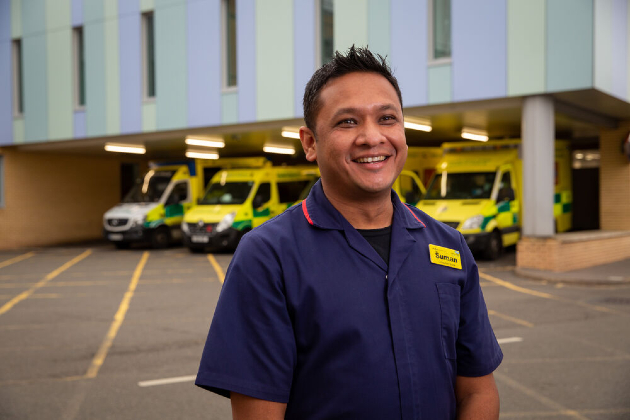How ANPs work within intensive care
Suman explains how advanced practice is shaping the future of nursing
The RCN recommends using an updated browser such as Microsoft Edge or Google Chrome
Senior paediatric practice facilitator Bex Howe says you have to be willing to adapt to keep your career on track

Nursing is my passion but being married to a soldier means I’ve had to work hard to achieve my career aspirations.
I qualified as a paediatric nurse in 2002, six years before I met my husband. I was, and remain, determined not to use being a military spouse as an excuse for not developing my nursing career.
Being able to adapt is essential. I face the reality of having to move every two years, because in the army, married soldiers are entitled to service family accommodation where they’re based. Currently my family and I are in our fifth house and we’ll be moving again in a few months’ time.
This has a significant impact on my personal and professional career choices.
The fact that I need to relocate so regularly is always in the back of my mind and has an impact on how I feel about jobs and my progression within them. It can sometimes be difficult for me to feel that I can give 100% in these circumstances, although I am committed to each of my roles, ensuring I satisfy as many of the role requirements as possible.

When I start a new role or project, I can't help but look ahead and consider whether I’ll still be here to finish it, or whether I’ll be able to develop the role further. If I’m honest, this started to hold me back, preventing me from reaching my true potential.
Developing work-based relationships is hard too. This shouldn’t be ignored – having good colleagues can be like having a second community of friends, which is important when you’re not living in one area for long enough to always establish long-term local friendships.
When I was first married, I managed by making small changes, however, I found that things became much more challenging when we started our family, as I was having to fit in nursery drop-offs alongside long commutes.
By this time, I had moved into a nursing education role so wasn’t juggling shifts, but I still needed to be able to respond to my employer’s needs. I maintained my professional credibility but had to become more flexible, taking on roles on the bank and providing maternity cover.
In the early days of being a military spouse I was reluctant to share information about my personal circumstances in an application form or during a job interview.
I feared being labelled, and that this could be used as a reason not to employ me.
Now when I talk to potential employers, I’m proud to be a military spouse and I promote the benefits that my lifestyle brings.
I’m open, honest and realistic about who I am and what I can offer. I’m quick to embrace new roles and responsibilities, adapt to change positively, and my resilience is now a huge strength.
These are skills many employers are looking for.
I’m proud to be a military spouse and I promote the benefits that my lifestyle brings
At the end of 2020, I chose to take a career break as my husband was due to be deployed with the army for eight months.
Although I would have been eligible for key worker education provision for my two children, the logistics of getting them to school while I was working brought many challenges, many of which would have been completely unmanageable.
I knew I needed to focus on my family life.
For someone as career focused as me, taking a career break was a big decision.
This was the only part of my life I could change, so I needed to be decisive and pragmatic
At this point there was so much out of my control, this was the only part of my life I could change, so I needed to be decisive and pragmatic.
I wanted to use this time wisely, adding value to my life both personally and professionally, while keeping my brain active.
I completed the RCN leadership development programme and reached out to external partners using social media, to continue to carve out my nursing career.
As a result, my CV won’t be blank for this time, something I hope future employers will see and appreciate.
I spoke to the RCN careers coaching service and they gave me advice for moving forward.
Key to this was the realisation that I needed to set myself short-term goals that can be achieved over a two to three-year period, rather than looking ahead all the time.
The significance of reflection is now more apparent to me than ever before. It allows me to consider my emotional achievement and how far I’ve come.
I hope that being more realistic and addressing one thing at a time, with small compartmentalised aims, will help me take small steps towards achieving my larger goals.
I needed to set myself short-term goals rather than looking ahead all the time
Constantly being on the move can sometimes feel overwhelming as I have to keep a lot of plates spinning.
But whatever our circumstances, it’s important to assess the reality of the challenges we face.
I couldn’t imagine living any other way and am grateful for and proud of what I have – a diverse and exciting life, alongside a rewarding career.

Suman explains how advanced practice is shaping the future of nursing

Lynne tells us about her challenging yet rewarding role

Your rights, top tips and what shouldn't happen

Hazel works with patients who have conditions including Parkinson's and MS

New RCN training provides the tools to enhance your practice

Maria tells us why this is her dream job
{{ article.Summary }}